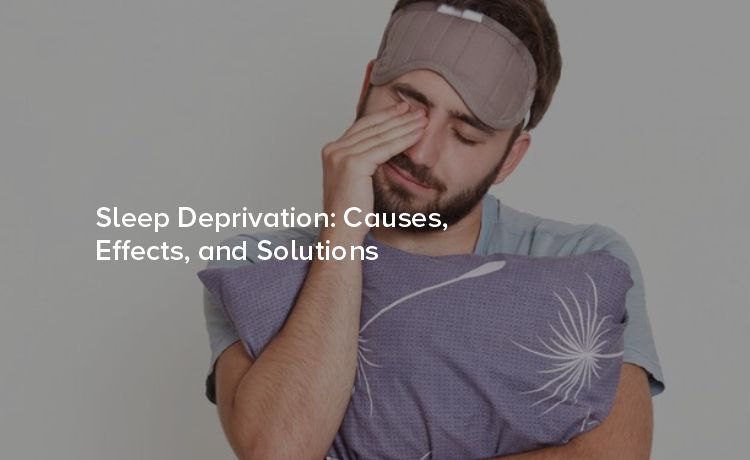
Sleep is as essential to human health as a balanced diet or regular exercise. Yet, millions worldwide face the pressing challenge of sleep deprivation. Whether due to lifestyle choices, work demands, or unresolved medical conditions, sleep deprivation can take a substantial toll on your physical health, emotional well-being, and overall quality of life.
Sleep deprivation occurs when you don’t get the amount of sleep your body needs to function properly. Sleep needs vary, but adults generally require between 7-9 hours per night. Anything less over a sustained period can lead to sleep debt, significantly impacting cognitive function, mood, and physical health.
There are two main types of sleep deprivation:
Understanding what keeps you from achieving restful sleep is the first step to solving the problem. Here are some common causes:
1. Lifestyle Choices
Late-night screen time, excessive caffeine, and prioritising work or social activities over sleep are all significant contributors to sleep deprivation. Many people unintentionally sabotage their sleep with these habits.
2. Stress and Anxiety
Overthinking, worrying about deadlines, or reacting to stressful situations can keep your brain active when it should be winding down. Stress-related insomnia is an increasingly common issue.
3. Shift Work
Irregular work schedules or night shifts disrupt your body’s natural circadian rhythm, making it difficult to establish a regular sleep pattern.
4. Sleep Disorders
Conditions like sleep apnea, restless leg syndrome, or chronic insomnia can prevent you from entering the deep sleep cycles essential for rest and recovery.
5. Medical Conditions
Chronic pain, hormonal imbalances, and even mental health conditions such as depression can contribute to sleep deprivation.
Sleep deprivation is more than just feeling groggy in the mornings. It significantly affects your mind and body in both the short and long term.
1. Cognitive Impairment
Lack of sleep impacts memory, decision-making, and reaction time. Studies show that sleep-deprived individuals perform tasks much slower compared to well-rested individuals.
2. Physical Health Risks
Prolonged sleep deprivation has been linked to a variety of health risks, including:
3. Emotional and Mental Health
Sleep deprivation amplifies stress, anxiety, and depression. It can also reduce emotional resilience, making small challenges feel overwhelming.
4. Reduced Productivity
Whether at work or in your personal life, insufficient sleep leads to reduced focus and efficiency, ultimately lowering your output and quality of work.
5. Safety Risks
Sleep deprivation increases the likelihood of accidents, particularly when driving or operating machinery. Countless road accidents have been attributed to drowsy driving.
While the effects of sleep deprivation might seem overwhelming, the good news is that it’s entirely reversible. Implementing healthy sleep habits often makes a world of difference.
1. Develop a Bedtime Routine
Establish a consistent bedtime and wake-up schedule to train your body’s internal clock. Incorporate relaxing activities, like reading or meditation, to signal to your brain that it’s time to wind down.
2. Limit Screen Time
Avoid screens at least an hour before bed, as the blue light from devices can suppress melatonin production, a hormone crucial for sleep regulation.
3. Optimise Your Sleep Environment
4. Mind Your Diet and Caffeine Intake
Avoid heavy meals, alcohol, and caffeine close to bedtime. Instead, opt for sleep-inducing snacks like bananas, almonds, or herbal teas.
5. Exercise Regularly
Regular physical activity promotes better sleep quality by reducing stress hormones and increasing deeper sleep cycles. Aim for 30 minutes of moderate exercise daily but avoid vigorous workouts in the evening.
6. Manage Stress
Practice mindfulness and relaxation techniques such as yoga, journaling, or deep-breathing exercises to calm your mind before bed.
7. Seek Professional Help
If lifestyle changes don’t improve your sleep, consult a doctor or sleep specialist. They can identify if underlying medical conditions or sleep disorders are causing your sleep issues.
Using sleep trackers or apps can help you monitor your sleep patterns and identify problem areas. Technologies like these are an excellent way to gain real-time feedback and make informed adjustments to your sleep habits.
Sleep is vital, yet so many of us sacrifice it for lesser priorities. The impacts of sleep deprivation stretch far beyond grogginess; left unaddressed, it can harm your health, wellbeing, and productivity.